In this post I want to show how critical keyword research is to your website success. This is not only important for organic listings, but paid advertising too!
So you’ve come up with a topic for a niche website and are eager to go, but there’s one more step you need to take before you start writing content. It appears obvious yet many individuals overlook it. That is keyword research!

The importance of keyword research
Table of Contents
The difference between a website that climbs the search engine listings, has thousands of visitors each day, and generates a significant income and one that goes unnoticed may be determined by the effectiveness of keyword research. Promoting your business with niche keywords can increase sales and profits.
Keywords are the words or phrases that a searcher enters into a search engine in order to locate anything on the internet. The process of selecting relevant keywords to optimise your web pages to rank and bring in leads and sales is known as keyword research.
How to research keywords
You don’t have to be a marketing expert to conduct your own keyword research. There are several tools available to help you. Instant Keyword Research and Keyword Elite are two excellent examples. Both are easy-to-use tools that will save you a lot of time and effort. The advantages of using such a tool are self-evident:
- You can find more specifically targeted keywords
- You can improve your search engine ranking
- You can save time
- You can increase your profits
- You can generate large keyword lists
- You can uncover negative keywords to avoid
If you’re not using the correct keywords and doing your homework ahead of time, you’ll be left in the dark. You are preparing to fail if you do not plan ahead of time. Before you leap out the door as fast as you can, you must have a strategy in place.
If you don’t consider where you’re going, what route you’ll take, and exactly what your game plan and objectives are, you’re wasting time. You won’t get a good return on investment.
10 Ways To Improve Keyword Research
- Think like a customer. I’m thinking to myself, “What will my customer search for in Google to locate the services I offer?” I’ll write down these notes in a notepad. If I’m working on SEO for a client, I’ll go over their website thoroughly. What services do they provide? What are their top products? I’d like to have a firm grasp of their business, service, and client base.
I’ll also reach out to that customer and ask them to complete an assignment. I’m going to say, “Client, I’d like you to prepare a list of 50-100 words you want to rank for.” I’m going to think like a consumer while keeping their information and my information separate.

- Reverse-engineering. Pull the keyword list from your competitors. When I’m looking to put a keyword list together let’s say for myself. As a Digital Marketing Agency, I can search for London Digital Marketing Agency or Edinburgh Digital Marketing Agency. Although these these companies are not my direct competition, we’re still within the same industry.
You may find their keyword list by using SEMRush or any other tool to pull that data. Pulling their keyword list might spark ideas for me, so don’t be afraid to look outside of your own area and into the bigger world, where there are big companies and big brands.
What you want to do now is go through their entire keyword list manually to ensure it makes sense for your business too. I mentioned London Digital Marketing Agency, so I would do a search for that term. Then I will open up a tool to find the keywords the company are using for their website.
You can use a suite of tools at SEObility. You can do a competitor site audit to see keywords and other things to be sure you set up your site to be better than theirs. You can see their keywords too in most cases.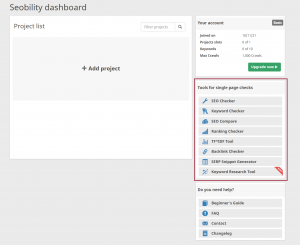
You can see the list of keyword tools on the right. If you click on SEO Checker, you can analyse both your own and other websites. This is what you see when you get there: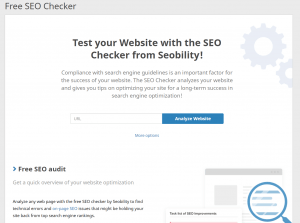
Some companies block results, so maybe use SEMrush, where you can sign up free and do a limited amount of research. Go to SEMRush.com and put in the url you want to research. You will be prompted to sign up, so do that and then you will see a page like this: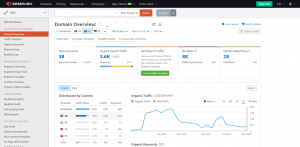
Scroll down the page and make notes and open everything up to see what ideas you can find. You can do similar at AHRefs too.
Another great tool is Keyword Revealer where you can get a free trial and analyse competitor keywords and everything needed. - Make some of these keywords longtail. Top tip for this is to use “the number one” or “top” or “best” or be more descriptive. Take your keyword list and add words to it to make them “long tail” and research each for search volume. EG. top digital marketing agency Coventry.
- Google intuitive search. Google is allowing me to see what others search for simply by beginning to type what I’m searching for. Collect these ideas and add them to your own keyword list.

- Look through the “people also ask” section and get ideas from those. Google Q&A is powerful and can be used to create rich snippets on your site too based on those keywords and ideas. Use those ideas and write each of them down.
Take note of those questions people are asking because you will be adding to your keyword list. You can create blogs answering those type of questions.
Google is giving you the answers to all the questions. It’s clear for everyone to see. You just need to know how to use it to choose the appropriate questions to write real organic traffic-generating content.
- Use location keywords – geo targeted keywords. Add your location to the keyword. Make it longer tail. Look at your whole list and start adding locations to the keywords. We’re looking for opportunities to get those low-hanging fruits that are right there. We need to grab them. Maybe your competition hasn’t looked at it.
- Be Flexible. When you’re compiling this keyword list, avoid thinking sell sell sell! You need more than keywords to just generate money. That’s not the way to think! You need to open up your mind to the thought of this.
If you educate people with your authority, with your knowledge, in return the search engines will reward you. When you’re putting this keyword list together, don’t make it solely about selling a service or product. You need to provide value and educate your readers too!
That’s right, every website should have a blog where you’re educating the client. The reason I’m telling you this is because value matters too! I want you to add keywords onto your list that are not jus based on sales. Add specific questions that might not make you a sale, but get you more readers to share your content.
You need to be seen as an authority in your niche. Look on other people’s blogs to get ideas and add those ideas or titles to the keyword list. Don’t copy the articles or blog posts. Pull the statistics to see if it’s worth you writing blog posts and content based on those keywords. - Statistics. If you don’t have the budget to invest a lot of money into this keyword list, then your best option is the Google Keyword planner. it’s free! You just need a Google account. It will give you a summary of competition levels and volumes per month.
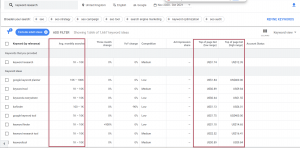
You can figure out keywords and statistics as to how many people are typing this in Google per month. You can manually go through this and start grabbing words that you want to rank for based on actual stats. If you’re new to this, even a search volume of ten per month might be worth dedicating some time to. Just a few of these can give you some decent visits if you do your job well.
There are paid tools available to help you dig deeper. SEM Rush, AHrefs and previously mentioned Keyword Revealer are just a few. - Prioritise and pursue. You should have a keyword list of anywhere from a hundred keywords to literally thousands of keywords. it’s time to start highlighting keywords you want to focus on in month one. keep that document because you need to concentrate on important keywords first, then move on to others.
Choose terms that are low to medium competition. Do not go for the highest volume because that’s not how to do this. Go for those type of longtail keywords that get 50 search volume per month. Those are the battles that you have an opportunity at winning.
To be successful with high competition, high volume keywords takes time. If you recognize that there’s only so much time in your day where you can devote to SEO, you need to break it down and diversify your approach.
Go for some low medium and high volumes, don’t just go for the high.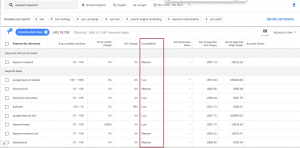
Continue to look for opportunities that make sense for our business. If you’re a beginner, you do not want to go for highly competitive keywords, but for those low search volume and low competition.
If you want to increase your profits, you’ll need some idea of the competition. These figures will allow you to see how many pages are competing for keyword positions and what you will need to pay when it is time to bid on keyword phrases in paid advertising. - Look On Social Media. Your target customer may hang out in places like Facebook, Twitter, Linked In, Pinterest, Reddit, YouTube, industry blogs and niche forums. You can also look on Quora for ideas based on questions asked.
Once you’ve identified where your target customer hangs out it’s time to keep an eye out for topics that are important to them.
Search for topics that are relevant to your product or service and go through the content you find. Look for ideas and associated keywords linked to those topics. That way you are doing something most will not do when doing keyword research.
It may be time consuming going through each platform, but growing your list of keywords is key to your potential success. Thinking “outside the box” when doing your keyword research could prove to be extremely valuable.
Keyword research – Pro Tip
Researching keywords isn’t just about finding the most popular keyword combinations. You can also uncover untapped keyword opportunities that can potentially drive a lot of traffic to your website and boost your ROI.
How to use your keywords
After you’ve done your research and compiled a list of relevant keywords, the next step is to figure out where to put them on your website. Placing your keywords in strategic locations can significantly improve your search engine rankings. If you use them too frequently, the search engines may mistake them for spam.

Follow this simple guide:
- Optimal use of keywords is 3-7 times on each page. Also include related and synonyms of keywords in your content.
- The title tag should contain your main keyword for your page content
- Headings tags should contain your main keyword or related keyword
- Use keywords in hypertext links
- Keywords need to be in the first and last paragraphs of the content
According to Internet Marketers and SEO Experts, keyword research and correct usage are said to be more important to a website’s success. So take your time with it, conduct your own study, and produce your content the right way.



